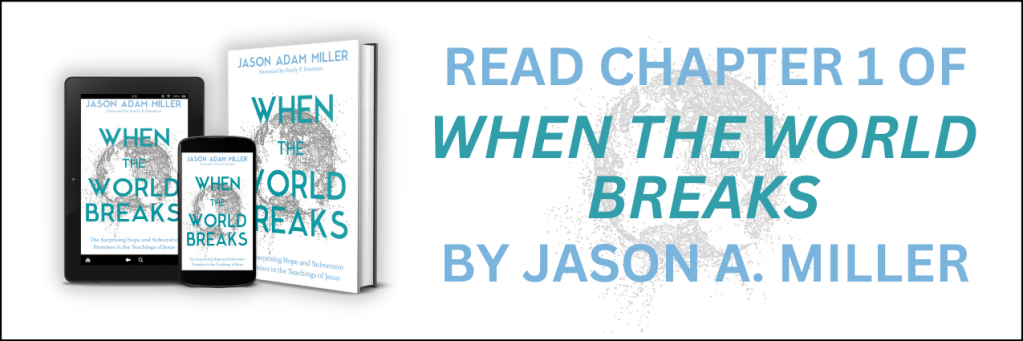An Excerpt of “When the World Breaks” by Jason A. Miller

Chapter 1 – The Blissful Existence of the Gods?
The world is breaking.
We’re still recovering from a pandemic that has taken millions of lives.
Our politics are seething with division.
Forests are burning and climate change is only beginning to show us all the harm it will do.
The racial injustice that some of us were taught to think of as a matter of history while others lived with it every day is being broadcast in real time.
A fault line has cracked open. Whether it’s at the hands of human agents or in the wake of some natural event, you can feel the ground shifting beneath your feet.
The breaking may not be in the headlines, though. It might be just for you. You get a call from the doctor and the diagnosis isn’t good. Or you find out your vows meant something different for you than they did for your spouse. Or maybe you feel the world breaking when your long-held beliefs about God or the Bible or faith slowly or suddenly slip through your fingers and the thing that acted as your compass is no longer there.
Whether the details are global or personal, the experience is the same: You discover that the framing reality you were living in has fractured. You experience this framing reality in the way your relationship with your parents and your job and the color of your skin and your beliefs about God and the investment return on your 401(k) and the latest update from the war on terror all conspire to tell you that you exist and that you’re a part of some coherent order in the world. To tell you that you’re going to be okay. But what happens when that changes?
This isn’t just a book about bad things happening. It’s about what happens when the fundamental picture we had relied on—our sense of how everything holds together—falls apart. This is what we sometimes mean by the word suffering, and if we don’t do something with our suffering, other forces will.
When the world breaks, bad religion will seize the moment. If the preachers can shame you, convincing you that a more faithful person wouldn’t be suffering like this, they’ll have all the power they need. They may sell you indulgences or demand your allegiance. If it isn’t shame that bad religion invokes when the world breaks, it may be escapism instead. Fantasies of a future where we can leave this mess behind are especially enticing when everything falls apart.
If it’s not bad religion that takes advantage of the moment, it may be addictive substances that fill the void instead. If we can just find a way to stay numb, we may not have to feel the pain of the breaking. It’s a ruse, of course. Those addictions create all new kinds of pain.
When the world breaks on the level of war or economics or terrorism or a pandemic, demagogues in the political sphere will inevitably seize the opportunity to divide and conquer us. They’ll weaponize our fear and teach us to become enemies. A quick survey of world history shows that some of the most violent leaders found their way to power in moments when the populace was feeling the ground quaking beneath their
feet. Everyone wants a benevolent authoritarian when they feel unsafe. When suffering is at hand, it can be exploited for the worst kinds of things.
But here’s the good news:
The world has been breaking for as long as we can remember.
I know—that may not sound like good news.
But it is, because it means we’ve been here before. And if we’ve been here before, then we can turn to ancient, perennial wisdom to help us sort through these urgent problems. And if we turn to that ancient wisdom, we may discover some surprises.
There are hidden possibilities lurking in these moments. They’re not revealed in some quaint moral teaching. They’re not found in the “power” of optimism that turns out to be nothing more than denial wrapped in an exhausting attempt to generate positive energy from scratch. They have nothing to do with the power to hit back, to break more things in response.
These possibilities are expressed in the subversive promises Jesus spoke when he taught the eight blessings—often called the Beatitudes—recorded in the beginning of Matthew chapter 5. These strange blessings name our experiences of suffering and are built on a surprising vision of hope. This book is a meditation on those teachings as a transformative way forward when we suffer.
To keep reading, download the full chapter below!
In this groundbreaking book, Pastor Jason Adam Miller re-examines the Beatitudes—eight paradoxes found in Jesus’ Sermon on the Mount—and points to a whole new way to find hope in the midst of suffering.
If the past few years have taught us anything, it’s that the world is broken. The world we thought we knew vanished, and so many of us are now struggling to make sense of a world that’s not what we thought it was.
This book is about what happens when the fundamental picture we had relied on – our sense of how everything holds together – falls apart. For some, this moment comes when a global pandemic upends our security. For others, it’s a partner leaving, or a terrible diagnosis, or the death of a loved one. Many of us have felt our worlds breaking when long-held beliefs about God or faith slipped through our hands. Whether the details are global or personal, the experience is the same: you discover that the framing reality you were living in has fractured.
But here’s the good news: The world has been breaking for as long as we can remember. We’ve been here before, which means we can turn to ancient, perennial wisdom to help us sort through these urgent problems. In When the World Breaks, Jason Adam Miller explores the possibilities for hope hidden in the paradoxes Jesus spoke when he taught the eight blessings – often called the Beatitudes – recorded in the beginning of Matthew chapter 5. These strange blessings name our experiences of suffering and are built on a particular kind of hope. This book is a meditation on those teachings as a transformative way forward when we suffer.
Lyrically written, theologically rich, and supremely accessible, When the World Breaks reveals an unexpected way to look at these familiar verses, giving readers hope that God is with them in their suffering, and helping them become the kind of people who can put things back together.






